Tips For Going Low Waste
24 comments
Hey friends! So I thought I'd do a little ideas blog about how people can work toward reducing their trash output. I am not zero waste, but I am low waste - and honestly I think that's a good thing to say, because so many people hear "zero waste" and think, there is NO WAY they could do that. "Low waste" makes it much more of a reachable goal, eh?
So yes, I produce more trash than a mason jar's worth, lol. But, the majority of my trash is litter scooping, and not a whole lot else, so I'm doing pretty good, I think. Probably 90% of my trash-trash is litter scooping (not counting recycling in that total). I produce around a plastic grocery store bag worth of trash a week; and a somewhat bigger bag of recycling per week (the cloth bag you see in this trash bin is actually my recycling bag!).
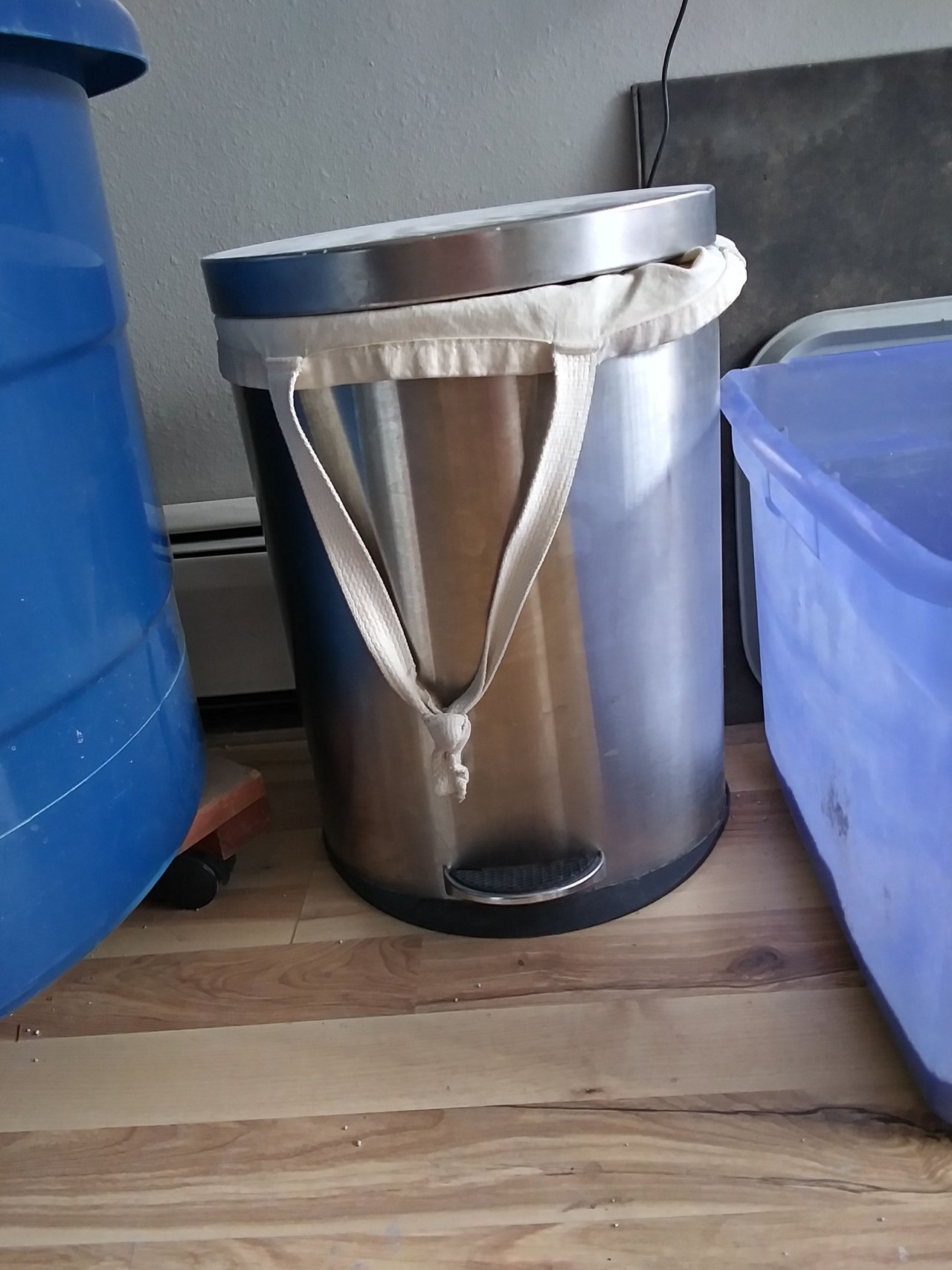
That being said, I don't often use a bag as large as a plastic grocery bag (though I sometimes do, if that's what I have), since that litter scooping gets stinky really quickly and you don't want that under the sink for a week. I tend to use smaller, random packaging as my trash bags (which is one way to reduce your waste!). Think about it: why buy (wasting money) new plastic bags (wasting resources) only to stuff them full of plastic packaging waste and throw it away, rather than use that plastic packaging as the trash bag for everything else?
So yeah, cereal bags, cat kibble bags, chip bags, whatever - those are generally my trash bags. There's tip #1!
Tip #2: Don't Overstuff Your Fridge and Pantry
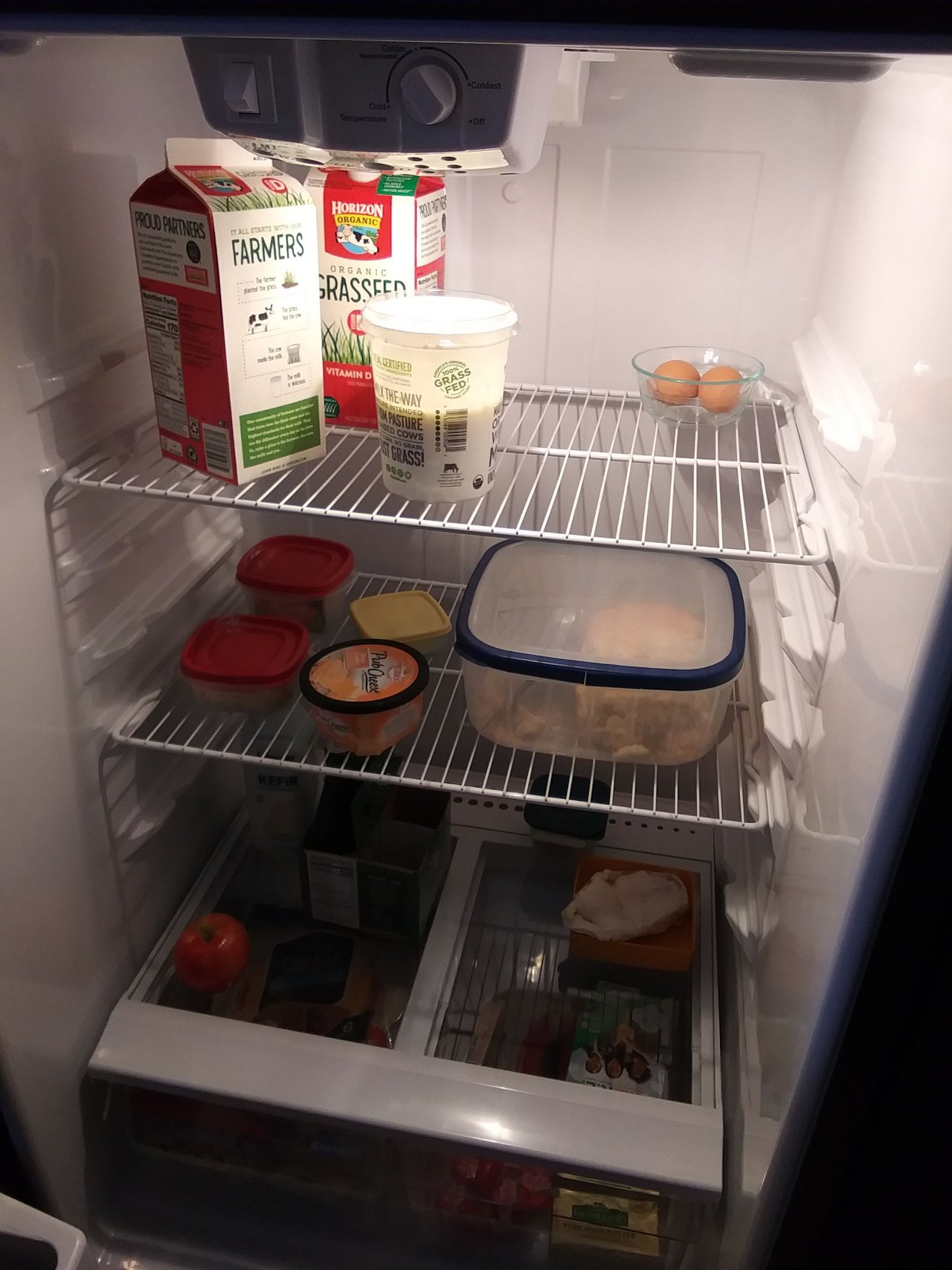
Keeping your stores low (this applies more of course to things that go bad quickly, but I know a lot of people overstuff their shelf stable pantry so much as well that things get hidden and go to waste there, too) enables you to keep better track of what you have and use it up, rather than things going to spoil before you eat it. This not only applies to produce (I buy very little produce at once unless I am making a specific recipe, because my single arse is not going to eat a whole watermelon by myself, for instance), but you people with your ten bajillion bottles of sauces in the door, I'm looking at you, too. I've helped friends clean out their fridges before and we threw away a dozen bottles at a time. Sometimes they had three bottles of mustard, two ketchup, three barbeque sauce, four salad dressings, etc. You can enjoy variety but try and limit it when it's a thing you don't go through that quickly! If you're eating four salads a week and you will actually use up those four salad dressings before they go bad, great. But if you don't use them that fast, maybe stick to two varieties and then just get a different one when one of those is empty.
Tip #3: make things from scratch that you use a lot of
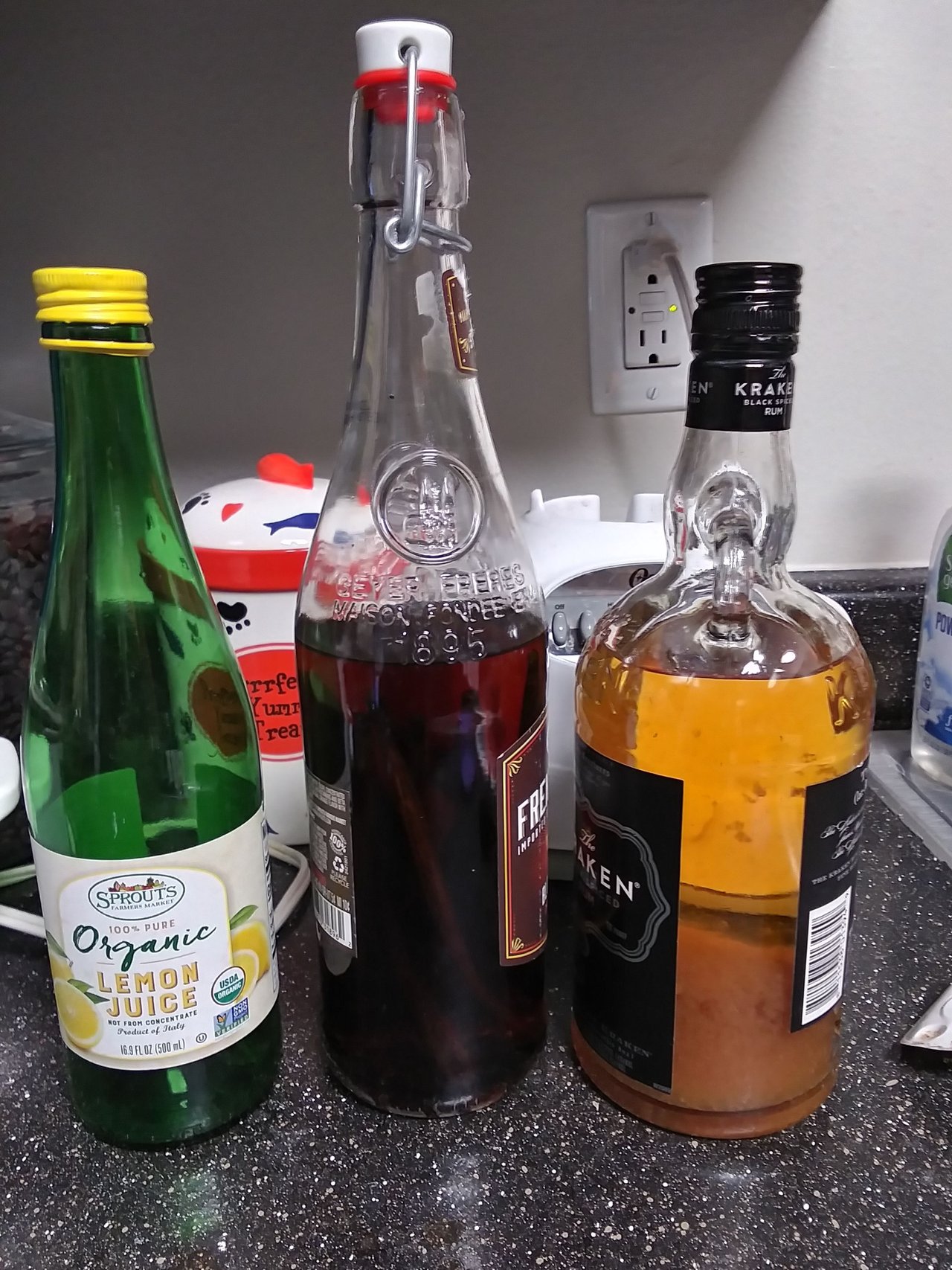
Bake a lot and so use a lot of vanilla (coughmecough)? Make yourself a whole vodka bottle's worth of vanilla extract at once (and save yourself a hundred dollars or so while you're at it - that stuff is hella expensive pre-made). Got apple scraps? Make some apple cider vinegar. Love lemonade? Buy bottles of lemon juice or squeeze some lemons yourself (I do both; was being lazy last time and bought a bottle of juice, lol) rather than plastic bottles of lemonade pre-made. I make my own enchilada sauce by the quart (not pictured; I need to make some), BBQ and chocolate syrup too. Those sauces and ingredients you are always tapping into you can often make yourself, cut down on packaging by buying the base ingredients in bulk, and save yourself a mint to boot.
Tip #4: Low Waste Doesn't Mean "throw out all your plastic"
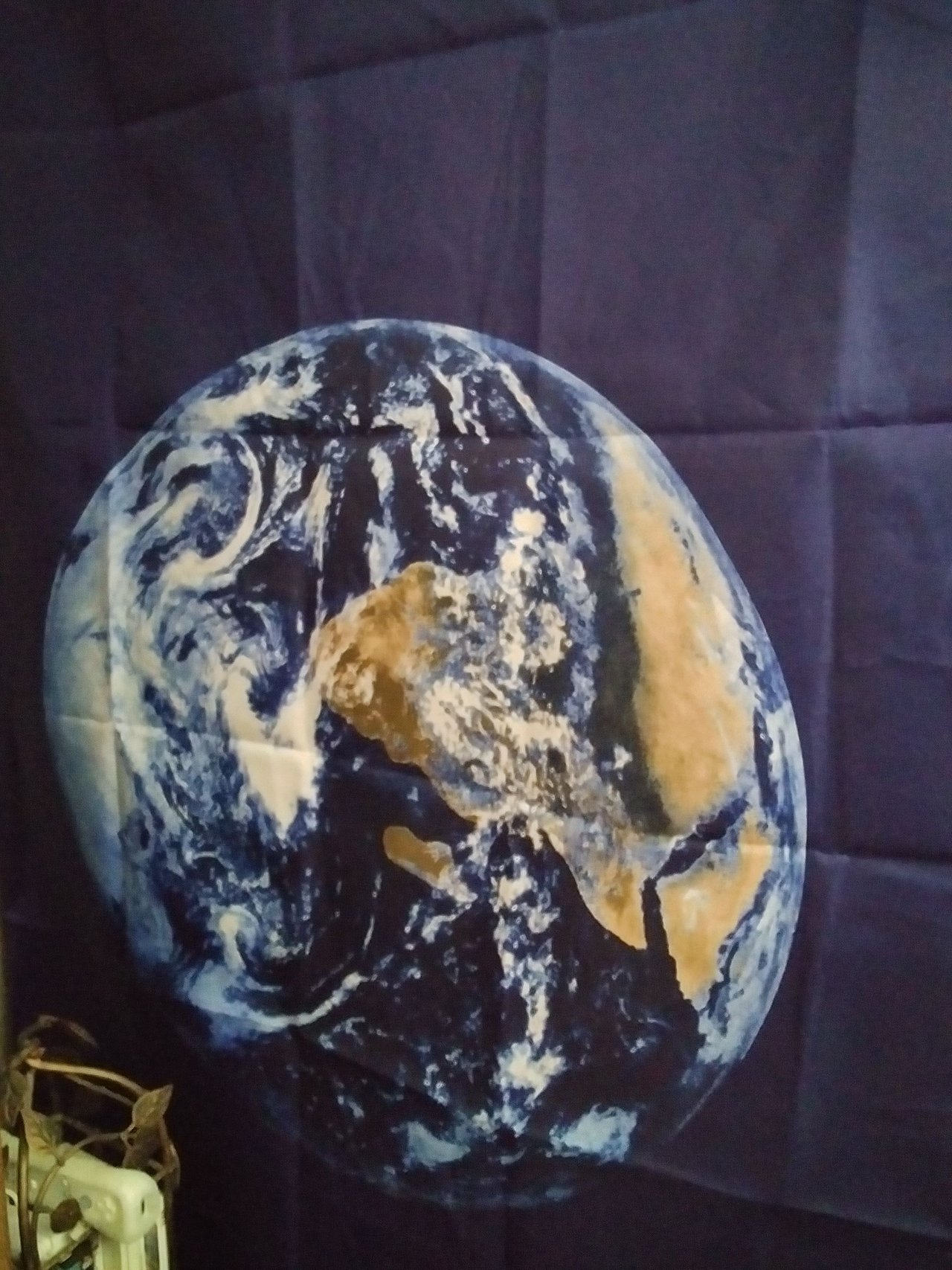
You may have noted that there was plastic tupperware in my fridge (GASP) instead of pretty aesthetic bamboo and glass everywhere! Yeah, because I've already owned that tupperware for years and I USE IT UP. Plastic is a problem, that's for sure - but you aren't helping to solve that problem by dumping a whole mountain more of plastic into the waste stream (and yes, dumping it in a thrift store bin just means that they are throwing it out for you 9.5 times out of 10) and consuming even more goods by replacing it with something green and trendy. As it wears out (it will, eventually - that bread box of mine has a broken seal and needs replacing), you can buy that nifty shiny glass replacement, if you want. But "low waste" means using up what you have until it's worn out and can't be used anymore. REUSE and REFUSE before recycle.
Think about how fucked up it is that capitalists will latch on to any trend and try and sell you shit with that in mind - including the desire to reduce your waste!! - by convincing people to throw out perfectly good things they already own to buy new shiny eco things that make them feel like they have solved the problem of overconsumption by ...consuming more.
I do try and limit my plastic use, especially in the single-use department, but obviously I haven't gotten rid of it entirely. It's about changing what you can to put the biggest dent in your impact, and if "no plastic" means that you are driving 50 miles all over town to different stores to source the non-plastic versions of things you need ...did you do less harm than accepting that plastic window in your box of pasta, that plastic yogurt quart over the many little glass jars, or out to a distant farm because the store has a twisty tie around the spinach? If me not owning a car means that I can't get to the no packaging store, but I can walk to the store and buy the least-packaged, least-plastic versions that I can, I think I'm doing ok. It's about doing what is right for you, in your circumstance, and your abilities, and progress over perfection.
Oh, and totally advocate at those stores and to those brands that you'd like better packaging, too.
Tip #5: Think Outside The Box
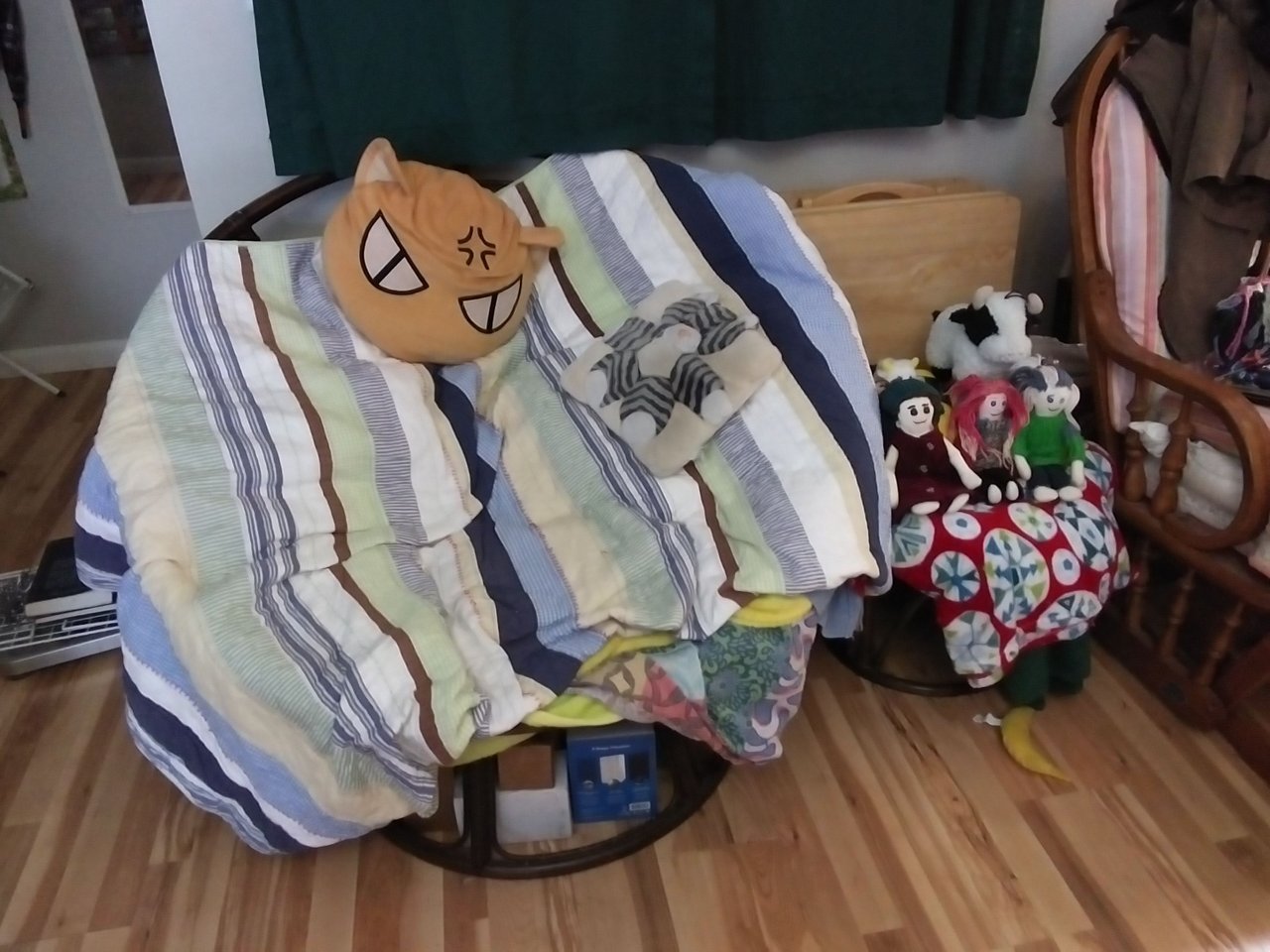
When my papasan cushions were toast (they got peed on by cats more than once as well as cloth mothed), I at first thought that I needed to go to the store and buy replacement cushions. After thinking about it, I realized I had a stack of blankets, more than I need for sleeping and curling up in with a book, just sitting in my closet. So I folded and stacked them with a couple of old pillows as well, and made myself makeshift cushions that work great, actually. If these have an ~incident~, cat or otherwise, I can actually put them in the washing machine, whereas the original cushion was too big to do that (I could wash the ottoman cushion, since it was small). I had tried washing the big cushion in the bathtub but that only worked so well (and was super difficult to manage as it was so heavy when wet). What things can you make out of things you already own, instead of buying new?
Tip #6: Keep Old Tech That Still Works
I've mentioned this example before I'm sure, but yes, I do still have cassette tapes and a working cassette player, and CDs and a CD Walkman as well. Do I also own an iPod? Yep. But ya know how most of the songs got on that iPod? I burned the CDs onto my laptop and transferred them. I have bought digital music since, but why buy again when you already own it? And why buy a new kitchen radio when you've already got one that you can jam out to your old 80s and 90s music on while you cook and clean? I also own a handheld CD/DVD cleaner. It takes a bit of effort, but I've saved many a scratched disc with it, rather than buying it again.
Maybe your example isn't music, but you see what I'm getting at. Do you need a new phone when your old one still works fine? Do you need to recycle all your old CFLs and buy LEDs instead of just replacing the CFLs as they wear out?
There are things where it can actually be more efficient enough to warrant buying new even if it's still kicking - I think refrigerators are one of those examples, but you'd have to check me - rather than keep the old version around. But generally, if it's still good - use it.
Tip #7: Pass It On (to a human, not a thrift shop)
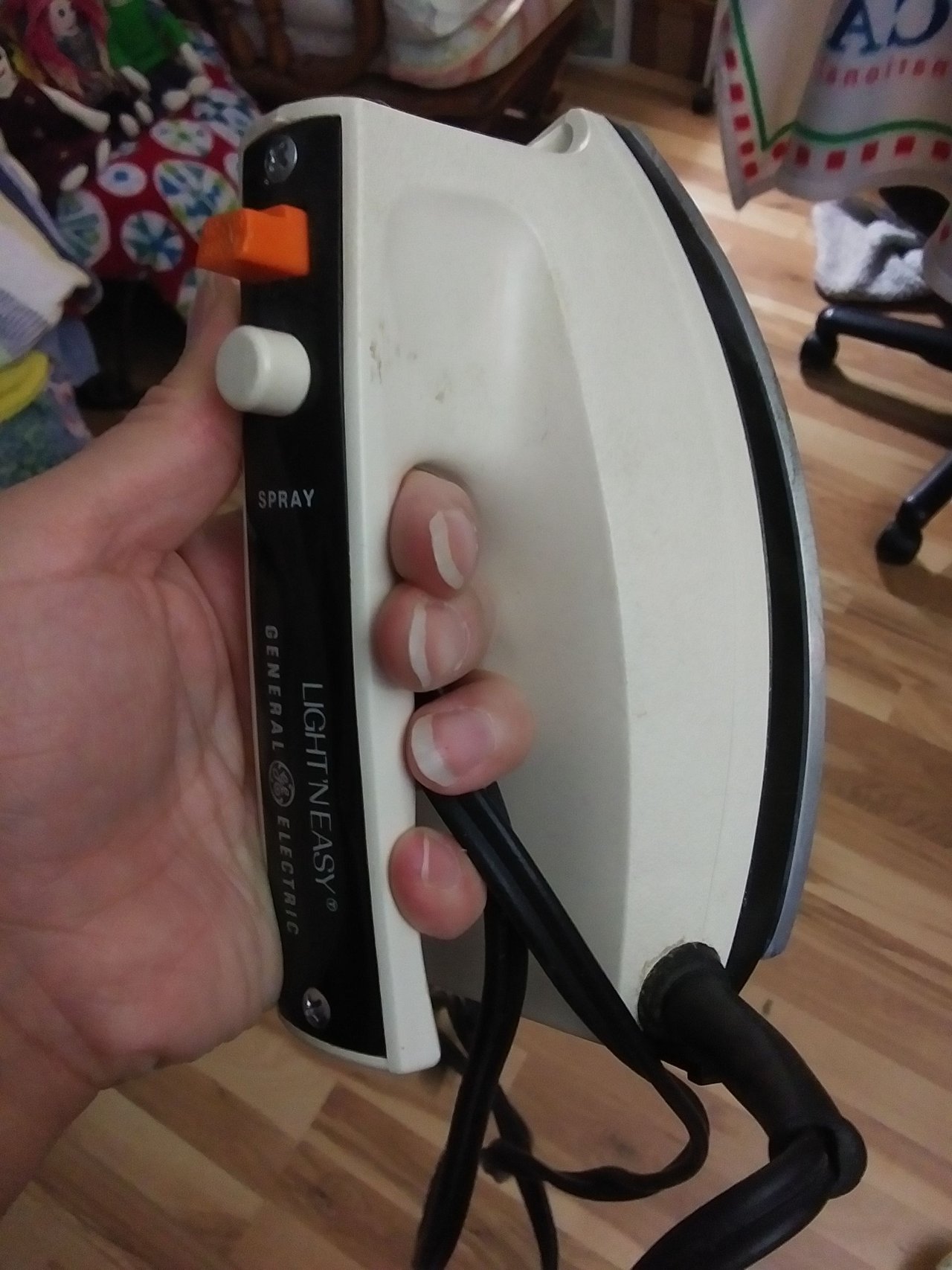
This was my grandmother's iron. I inherited it years ago and it still works well. When you have things to give, find a person who needs it, rather than dumping a carload at Goodwill. Why is this so important?
People dump all kinds of trash at Goodwill and they aren't holding onto it just in case someone wants it on your behalf; they are throwing it away. And not just broken, trash-trash, but things that they know they aren't going to sell/they get too much of (see: your old cheap tupperware). I'm not even going to get into how certain orgs like Goodwill and the Salvation Army are problematic; even if they were shining beacons of goodness, they are inundated with stuff, and they only have so much store space.
So what to do with your stuff that you just Marie Kondo'd the heck out of your closet? Join Buy Nothing (there's an app now, so you don't need to join Facebook) and offer it for free to your neighbors. There are, as you might have guessed, also Buy Nothing/Free Community groups on Facebook, Craigslist, and Freecycle. Put books and magazines (NOT ones that are moldy/have bedbugs/etc.!!) in Little Free Libraries. Use up your yarn stash making warm clothes for homeless people, or mats for cats and dogs in shelters (they get something comfortable to rest on in their kennels and they are more likely to be adopted if they have something "homey" in there with them rather than just a pee pad and newspaper!). Donate nice work clothes and hangers to Dress for Success, donate prom dresses to programs like Becca's Closet, donate camping gear to mutual aid orgs that distribute it to our homeless neighbors. There are countless alternatives that are looking for specific items, and groups where people can exchange things for free. It takes a bit more effort on your part than stuffing it all into trash bags and tossing it in the Goodwill bin, but it's exponentially more likely to actually get used this way, rather than chucked into a trash bin by a tired thrift shop employee.
We all need to take responsibility for our stuff, both when we're choosing what to buy but also when we are done using it. Just as we want corporations to take responsibility for their waste and pollution, a circular economy requires us all to do our part too. Yes, there are some things where there is no other place for it to go but the bin. But if we all put more effort into managing our stuff, a lot less stuff would end up in landfills and incinerators.
And you thought I was gonna talk about straws and shopping bags, huh? 😉


Comments